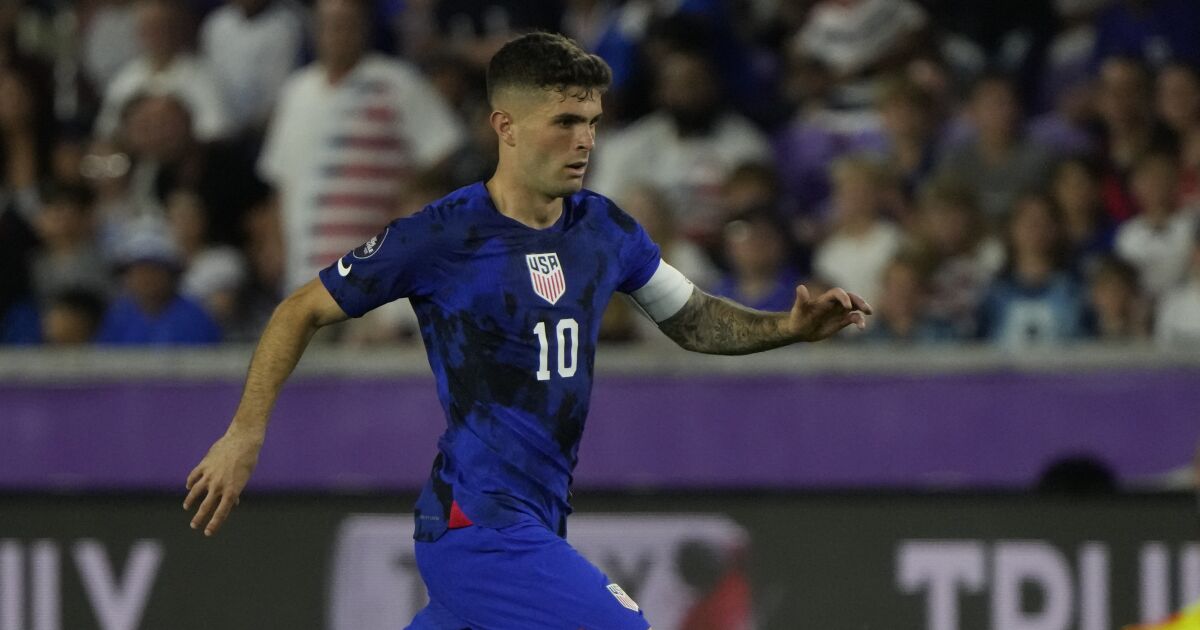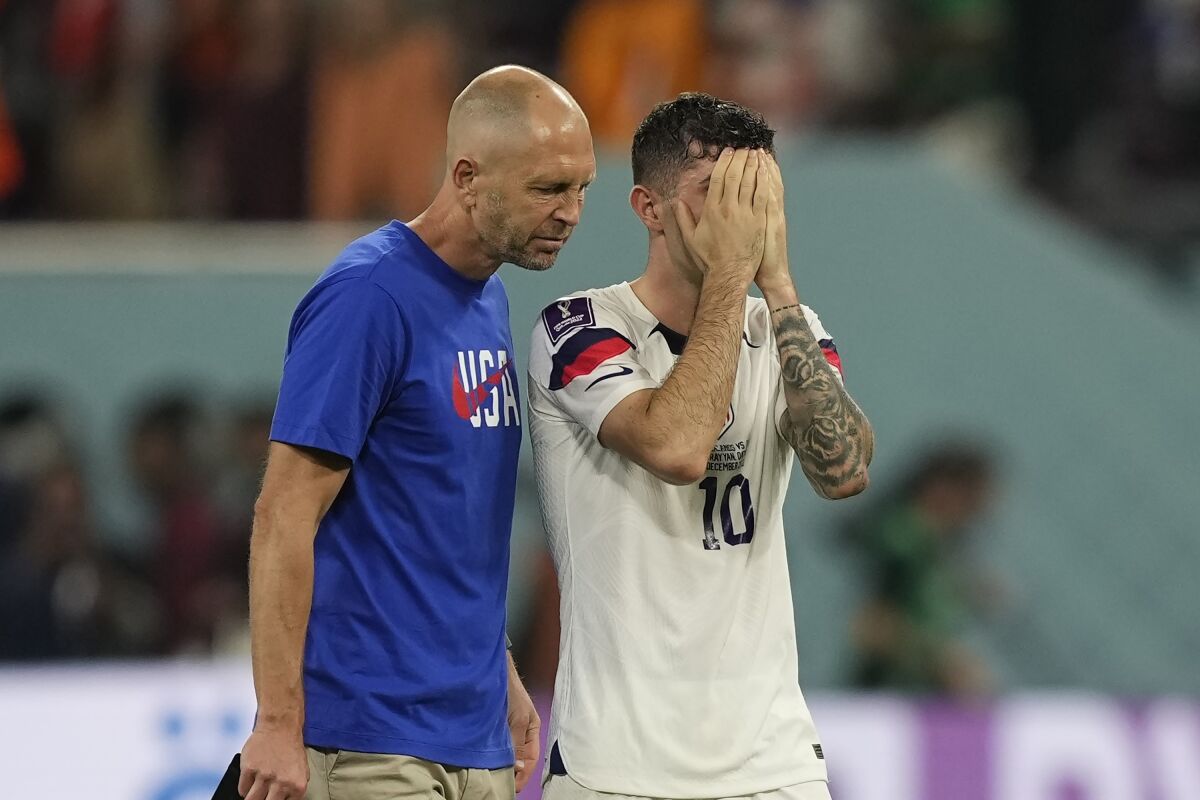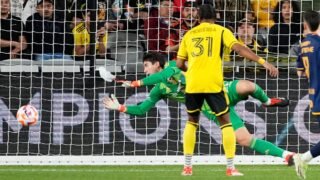
Why Christian Pulisic supports Gregg Berhalter as USMNT coach
Gregg Berhalter coached his last game for the national team at the World Cup in December. Since then, the United States has played five games for an interim coach, Anthony Hudson, and will play at least five more for another interim, B.J. Callaghan, over the next month.
All that seems unnecessary to Christian Pulisic, the team’s leader and former captain. As far as he’s concerned, the team has a coach in Berhalter, and the longer the federation plays games with his future as manager, the more it hampers preparations for the 2026 World Cup, the most important in U.S. Soccer history.
“It’s all come as a bit of a surprise for us with some of the changes,” Pulisic said Monday in Carson on the second day of training camp ahead of next week’s Nations League semifinal against Mexico in Las Vegas. “We’re dealing with it as best as we can. We’ve spoken and given our input as much as we can.
“It’s not our job as players to appoint a manager, or whatever the deal is.”
That is U.S. Soccer’s job, and the federation is making a mess of what should be a simple, straightforward process.
Berhalter has a better winning percentage than any other permanent U.S. men’s team manager. He led the team to Gold Cup and Nations League titles, to the round of 16 in the Qatar World Cup and victories over Mexico three times in a calendar year, something no American coach has done. There can be little serious debate that he’s the best man for the job.
Yet he remains sidelined by the federation’s internal politics and a soap-opera attempt at blackmail initiated by the parents of one of his World Cup players.

U.S. men’s national team coach Gregg Berhalter, left, walks with Christian Pulisic after the United States lost to the Netherlands at the Qatar World Cup in December.
(Martin Meissner / Associated Press)
To review: When Berhalter’s four-year contract expired in December, U.S. Soccer launched a standard technical review of the men’s national team program. As that review was conducted, Claudio and Danielle Reyna, upset over the way their son Gio had been treated by Berhalter in Qatar, informed the federation of a three-decades-old domestic violence incident involving Berhalter and the woman who would become his wife.
U.S. Soccer paused its review and hired an outside legal firm to investigate the charges. By the time the probe cleared Berhalter, Earnie Stewart, U.S. Soccer’s sporting director, and Brian McBride, general manager of the men’s national team, had left the federation. A new sporting director would need to be hired before a decision on a new coach could be made, yet Matt Crocker, the former British soccer executive chosen to replace Stewart, hadn’t reported to work before Hudson asked out his contract as interim coach, turning the job over to Callaghan.
Talk about a way to spoil momentum: Since January , the U.S. men’s national team has had as many sporting directors and as many interim managers as it has wins. Still, choosing a permanent manager, a process Crocker will lead, could take the rest of the summer, he said.
However, if he were to simply ask the players, this whole thing could be wrapped up in an afternoon.
“He did a great job with the team. He brought us a long way,” Pulisic said of Berhalter. “I think a lot of people — and a lot of guys in the team, especially — would agree with that.”
The core of the national team came up with Berhalter, established themselves under his leadership and found success with his style. Captain Tyler Adams, midfielder Weston McKennie, goalkeepers Matt Turner and Zack Steffen, and defenders Sergiño Dest and Antonee Robinson, among many others, either made their international debuts or became national team regulars under Berhalter. Even Reyna got his first call-up from Berhalter.
“Gregg has done a great job for the national team. The record speaks for itself,” defender Walker Zimmerman said. “He did a really good job of creating a team culture and a chemistry that was impressive. He has handled a lot of things very, very well.”
In short, the players like him, respect him and are comfortable playing for him. With the next World Cup on the horizon, time is running out to build that kind of rapport with another coach, something Pulisic pointed out earlier this spring.
The addition of tri-national striker Folarin Balogun, who will make his U.S. debut next week, would give Berhalter the No. 9 his tactical approach has lacked.
In the meantime, the team will play for Callaghan, who, like Hudson, was a member of Berhalter’s staff at the World Cup and has largely maintained his boss’ style and philosophy.
“I’ve had quite a few managers in my time, so I’ve dealt with change,” said Pulisic, 24, who has played under five men with the national team and 11 with his club teams. “B.J. has been part of Gregg’s staff. We know him well. He’s not going to come in and try to change everything. We’re going to be well-prepared once the game comes around.”
Added Turner: “There’s a lot of continuity. We have a really strong group. That’s been one of our anchors, one of our biggest strengths throughout the World Cup, through World Cup qualifying. So just more of the same. I think we’ll rely heavily on each other.”
Until they can begin relying again on Berhalter.
⚽ You have read the latest installment of On Soccer with Kevin Baxter. The weekly column takes you behind the scenes and shines a spotlight on unique stories. Listen to Baxter on this week’s episode of the Corner of the Galaxy podcast.










